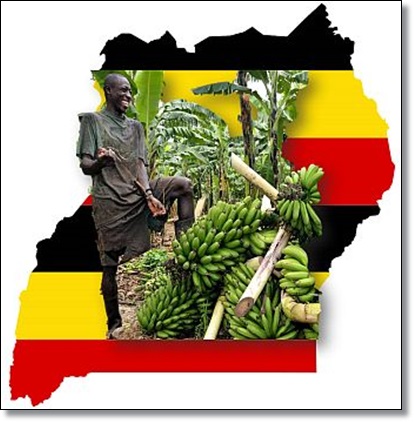Agriculture Taxes Spell Doom for Uganda Agriculture

 |
| A Ugandan farmer proud of his banana harvest |
The assumption at the Ministry of Finance that many smallholder farmers will not be affected since they don’t engage in inputs markets is at most wayward and diversionary. The argument is also careless and lazy, because it seems to rather celebrate the perpetuation of subsistence agriculture in Uganda.
Since millions of farmers no longer have seed rights expressed through home grain granaries, they have to buy seed and other implements in open input markets. The inputs traders will just pass the VAT incidence to farmers. And 98% of these farmers have not rights under our obtaining tax code to claim VAT returns from the Uganda Revenue Authority (URA) since they don’t have a requisite turnover of shs 50 million and above to qualify for VAT tax returns.
Whereas, paying taxes is a good thing-and equally expanding tax base is a legitimate pursuit of any Nation State, taxing instead of incentivizing agriculture in Uganda’s circumstance is a big mistake. Even when taxing agriculture, it is grave to tax inputs because such undertaking increases initial cost stream and discourages investment in the sector. Taxing agricultural outputs/products is instead logical-because then that becomes income tax, and any taxation on profits makes sense.
If a farmer, for example, puts two tons of coffee on the market per annum, a 5% tax or so is affordable and legitimate. If a beef farmer puts on the market 30 or so animals on the market per annum, a similar foregoing tax can be levied and that is reasonable. But to put a tax on the pumps and acaricides that this beef farmer needs to raise animals competitively is simply wayward. This has implications for food and nutrition security as well as household incomes, investments, productivity and agricultural competitiveness. We must take note that competitiveness is essentially a result of reduced cost of production-yet these taxes will serve an opposite purpose!
In a recent cost of doing business and post budget dialogue for businesses in Mityana and Mubende (hosted by Agency for Transformation with support from USAID-GAPP-RTI program) farmers and other agriculture chain actors argued that these farmer targeted taxes will inhibit production and are tangential to the spirit of the State of the Nation address delivered by President Museveni. The President was categorical that agriculture was to be supported to create employment, improve exports, support income improvement and help create competitive business farmers. Farmers want the Ministry of Finance and Parliament to correct the distortions in Hon. Ministers Kiwanuka’s budget that taxed farmers to death and contradicted the President’s State of the Nation Address.
By removing all value chain support equipment and supplies tax incentives, it will get worse for the already expensive machinery and equipment that farmers urgently need to produce and govern markets. Inputs like seeds, fertilizer, pesticides are very expensive so far and it will only worsen farmers’ situation and productivity will be affected. Intermediate inputs like packaging will become even more expensive and yet essential for placement, storage of products and value addition.
We must remember that our competitors in the region bring finished products already packed and yet we only charge them on finished products! As Parliament takes on scrutiny of the budget numbers, it’s my expectation that keen interest on this avalanche of agriculture taxes will be self-evident – and these input taxes will be scrapped.
By Morrison Rwakakamba
The author mrwakakamba@gmail.com Chief Executive Officer, Agency for Transformation – Think and Do tank.
